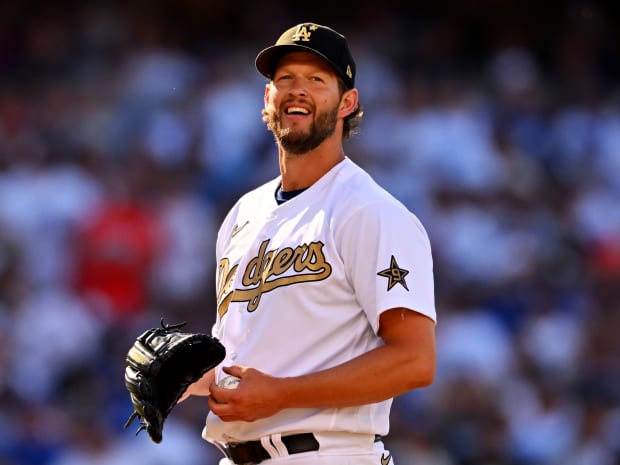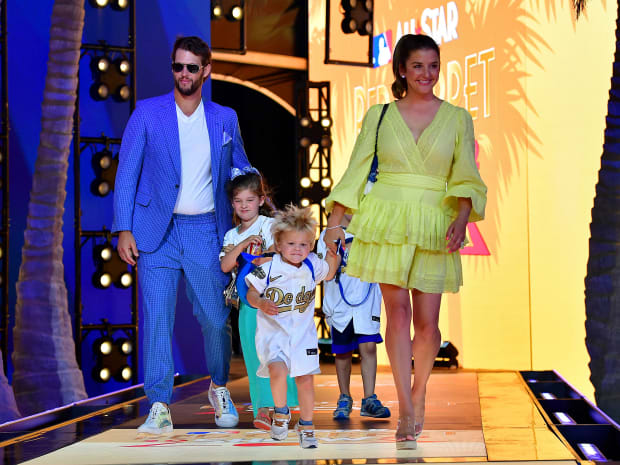LOS ANGELES — On Tuesday, for the 215th time, Clayton Kershaw took the mound to start a game at Dodger Stadium. On Tuesday, for the first time, he looked around.
He arrived in Los Angeles in 2008, a lanky 20-year-old with a preposterous curveball who accidentally pulled on Jason Schmidt’s jersey before his first game with the team. He sharpened his legendary intensity here. He won three National League Cy Youngs here. He threw a no-hitter here. He made nine All-Star teams here—including this one, when for the first time he was named the starter. He befriended Sandy Koufax here. He learned he would be a father here. He inspired countless kids to add a hitch to their delivery here. He hurt his back here. He pitched through the pain here. He suffered half a dozen excruciating playoff losses here. He slumped by his locker in October and wondered if he would ever stop failing here. Last spring, he received his first World Series ring here. Some day soon, he may retire here.

Jayne Kamin-Oncea/USA TODAY Sports
At 5:18 p.m. Pacific, after his teammates lingered in the home dugout so he could take the field alone as the 52,518 in the stands roared, a 34-year-old Kershaw jogged to the center of the diamond and paused at the back of the mound. What did he see?
Kershaw laughed. “You’re trying to get me all deep,” he said. “I just saw a lot of—I just saw a lot of people that meant a lot to me. Looking around the stadium, I saw a lot of people that were here to watch a baseball game, and I got to be a part of it, so it was cool.”
He did not have to explain what this game meant to him. The American League won 3–2, extending its dominance to nine straight contests, but that hardly mattered. He insisted on Tuesday that he cares more about attending the All-Star Game than about starting it, but his manager, Dave Roberts, said on Monday that he had noticed “some nerves” from his ace. Atlanta manager Brian Snitker, who skippered the NL team, called Kershaw on Saturday, a day after the lefty took a perfect game into the eighth inning against the Angels. “I want you to start the All-Star Game,” Snitker said, joking, in reference to the night before, “I thought you were campaigning for it.” The assignment was something of a career achievement award, although Kershaw has a 2.13 ERA this year. Snitker understood what it would mean to the city—and to the pitcher—to have the franchise icon pitch in the first All-Star Game here since 1980.
Kershaw understood, too. The conversation was brief, but in some ways, he tried to treat it as any other start: the same workouts, the same focus. But Kershaw loves the All-Star Game in part because it offers him one night a year to be around baseball without caring about the result.
“He doesn’t have to essentially be on,” said Roberts. “And for a guy that’s on for eight months out of the year to kind of have a couple of days of break or reprieve, I think he always enjoys that.”
He also cherishes the chance to share the experience with his wife, Ellen, and their four children, 7-year-old Cali, 5-year-old Charley, 2-year-old Cooper and 8-month-old Chance. The only role he enjoys more than ace is that of husband and father. So he spent much of the week toting the kids around the festivities instead of watching video. (“I don’t think I’ve ever been more tired than last night,” he said of trying to keep track of Cooper at the Home Run Derby.) And he studied his heat maps and splits—to an extent.
“I tried to figure out how to get [Yankees right fielder Aaron] Judge out,” he said. “I had faced [Angels two-way star Shohei] Ohtani before, Judge and [Red Sox third baseman Rafael] Devers, and I went all the way down to fourth. If I had to face more than four batters, I didn’t know what to do.” He laughed.
Fortunately, it did not come to that. As Ohtani dug into the batter’s box, he waited for Kershaw to look his way, tipped his cap in what he later called a sign of “respect to the pitcher” and immediately lined a single to center field. Three pitches later, Kershaw picked him off. Both pitcher and runner cackled as Ohtani cleared the field. Kershaw caught Judge looking, walked Devers and induced a grounder from Blue Jays first baseman Vladimir Guerrero Jr. to end the inning.

Gary A. Vasquez/USA TODAY Sports
He did not take a curtain call as he strode off the mound, but he did accept the ball from the final out.
“I actually had a lot of fun pitching, which usually I don’t have a lot of fun until we win,” he said afterward. He added, “It’s not that I was unappreciative in my younger days. I just felt like I had to keep my nose down and keep going. I think that’s how I felt like I needed to do it to be successful. There’s still a lot of that in me. You just have to keep going. Can’t take it all in because it could be over at any minute. But I think as I’ve gotten older, understanding moments like these are unique and just kind of understanding that it’s not going to happen again. So I think that was a lot of it, too. Knowing that I’m not going to get to start an All-Star Game at Dodger Stadium ever again, it was just really cool for me to kind of take that all in at once.”
He spoke shortly after he exited the game, as the second inning played out without him, and he seemed eager to return to the dugout. But as he stood to leave, a 10-year-old from Denver named Blake Grice approached the podium.
“Oh, dude, sorry,” Kershaw said. “Whatcha got?”
Blake explained that his grandfather, Graham, had died of brain cancer a few years earlier. Graham had loved the Dodgers and Kershaw, and had hoped to meet him some day. “So this moment is important to me because I’m meeting you for him,” Blake said, beginning to cry.
Kershaw pulled him into a hug. “Come here, dude,” he said. “Great to meet you. Thanks for telling me. That took a lot of courage to tell me that. Great to meet you. Your granddad sounded like an awesome guy. Thanks for coming up. That took a lot of courage, man, that was awesome. Thanks, buddy.”
They took a photo, and Blake returned to his family. For the first time, he was going to watch a game without caring about the outcome here.







